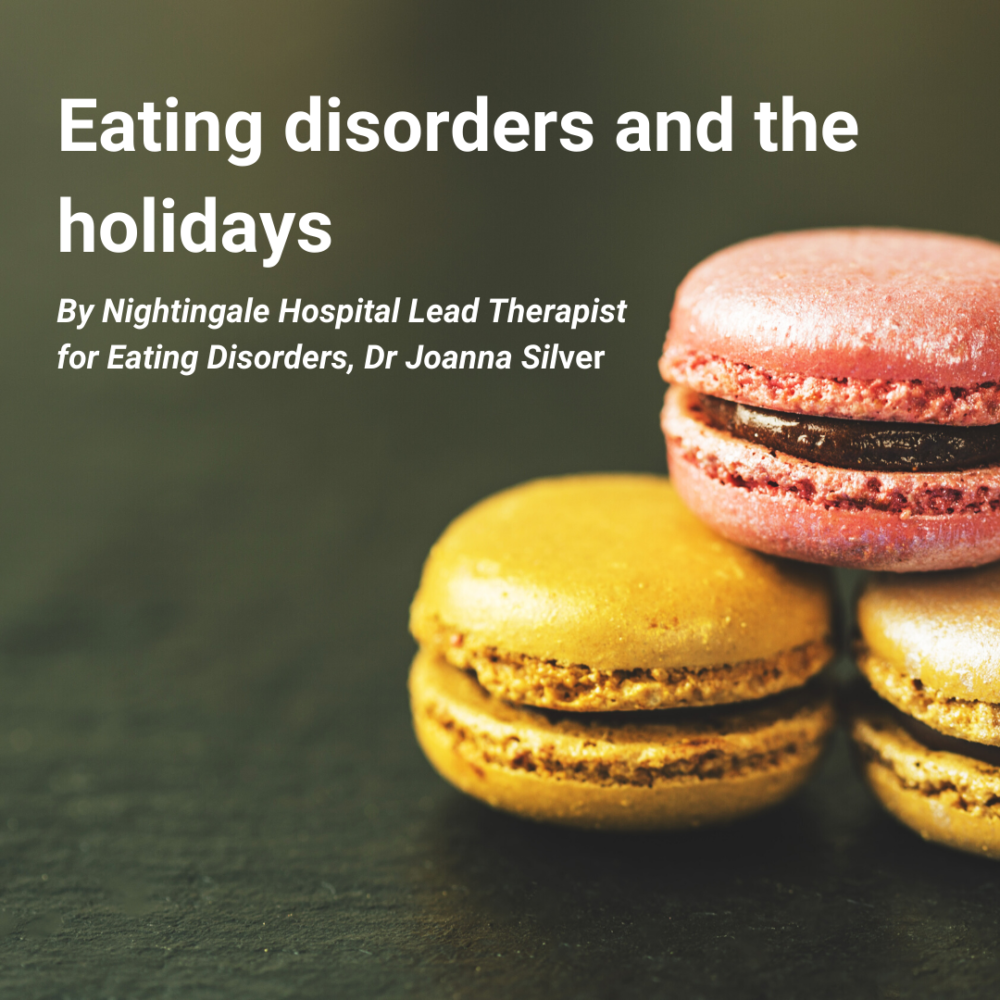Eating disorders and Christmas: Challenges and tips for sufferers and loved ones
There’s no doubt about it – food is a huge focus at Christmas time. This can lead to a variety of challenges for those in any stage of an eating disorder.
Nightingale Hospital’s Lead Therapist for Eating Disorders, Dr Joanna Silver, gives her helpful tips on how to get through the festive period, for both the sufferer and their support system.
Challenges faced by the sufferer of an eating disorder at Christmas
The pressure to eat different foods (both quality and quantity), the idea of unstructured meal times, and the overall disruption of a usual routine can be hugely overwhelming for a sufferer of an eating disorder.
On top of this, there can be an expectation for Christmas to be ‘perfect’ adding to the feelings of pressure that the sufferer may be feeling.
Often people see the wider family at Christmas. This can be difficult as sufferers may feel judged by others or unsure of how to interact with them. Additionally, there can be a lot of talk about food and weight which can be difficult to manage.
Challenges faced by families supporting someone with an eating disorder
Christmas time is also particularly hard for the family of the sufferer.
Families may be aware of the challenges faced by sufferers but unable to know how to be supportive, breeding this idea of treading on eggshells around the sufferer.
Families also might feel torn between meeting the needs of their loved one with an eating disorder, whilst also ensuring that other members of the family have an enjoyable Christmas.
Helpful tips for the sufferer of an eating disorder
- Plan as much of Christmas in advance as possible. If you are in treatment it will be helpful to dedicate sessions with therapists and dietitians etc to plan in advance what to eat. It may be a good idea to bring a relative to the sessions with you and to practise the meal in advance.
- Think carefully about where you are in treatment and what feels appropriate in terms of planning. For example, if someone is in the early stages of treatment it may be best to follow their usual meal plan as much as possible. Conversely, someone in the later stages may feel more able to be flexible.
- Think about who can support you during difficult times and agree beforehand on what is most helpful. For example, it may or may be helpful for a trusted relative to comment if they feel you are over/under portioning. It is important to have these conversations long before the festive period and definitely not during meal time.
- Identify times that you are most likely to be vulnerable and plan some non-food-related activities during these times. For example, watching a film or playing a board game.
Helpful tips for the family supporting a loved one
- Have a conversation with your loved one in advance of the festive period (and never during a meal) about what is and is not helpful for them. Everyone is different so it is really important to talk about what they find supportive. It can also be helpful to assist them with the planning of the meals and times.
- It can be difficult to manage the needs of the person with an eating disorder and the rest of the family. In these situations, compromise can sometimes be helpful. For example, if the person with the eating disorder usually eats at 12.30 pm and the rest of the family plans to eat at 2:00 pm, eating at 1.15 pm can sometimes work.
- Discuss with your loved ones how much information they want others to know about their condition. It can be helpful to ask others to not discuss food/ weight and to try and change the conversation if this happens.
- If you are hosting a meal think carefully about where you place the person with an eating disorder. It can be unhelpful if the person is placed next to another person with eating issues.







